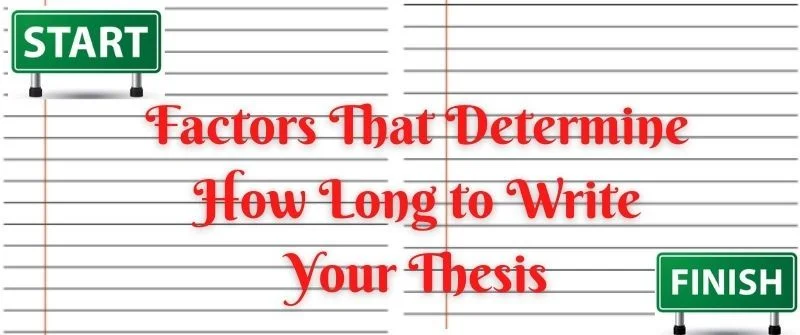

How Long Is a Master’s Thesis? 5 Tips on Writing and Structuring Yours
- Natasa Pantelic
- November 10, 2023

Writing a Master’s thesis is a significant academic endeavor. It marks the culmination of graduate studies, showcasing your ability to conduct comprehensive research and present your findings coherently , also be sure to check out best places for you where to study abroad .
Knowing about the typical length of a Master’s thesis and how to structure it effectively is crucial for a successful submission. This article will guide you through understanding the expected length, how to structure your thesis, and tips to manage your writing process efficiently.
Typical Length Variations

The length of a Master’s thesis can vary significantly depending on the subject matter, the specific requirements of your academic institution, and your research topic.
Generally, a Master’s thesis is between 40 to 80 pages in humanities and social sciences but can be longer in more technical fields like engineering or natural sciences. It’s crucial to check with your department for specific guidelines.
For expert guidance and tailored assistance in crafting your master’s thesis, consider exploring the resources available at thesisrush.com , a platform dedicated to helping students excel in their academic writing endeavors.
Factors Influencing Thesis Length
Several factors can influence the length of your Master’s thesis:
- Research Depth: More complex research projects may require a more detailed explanation and analysis.
- Academic Field: Technical fields often have longer theses due to the inclusion of data, formulas, and extensive experimental details.
- University Guidelines: Some universities have strict length requirements for theses.
The Importance of Conciseness and Clarity
While length is a consideration, the quality of your work is paramount. A concise, clear thesis is often more impactful than a longer, less coherent one. Prioritize presenting your research and arguments in a clear, concise manner without unnecessary elaboration.
Structuring Your Master’s Thesis
A well-structured thesis is critical for effectively presenting your research. Here’s a standard structure to follow:
Introduction
- Context and Background: Set the stage for your research by providing relevant background information.
- Research Problem and Objectives: Clearly state the problem your research addresses and your objectives.
- Thesis Statement: Present your main argument or hypothesis.
Literature Review
- Current State of Research: Discuss existing research related to your topic.
- Identification of Gaps: Highlight where your research fits into the existing body of knowledge.
- Relation to Your Research: Explain how this literature informs your research question.
Methodology
- Research Design: Describe the framework and design of your research .
- Data Collection: Explain how you collected your data.
- Analysis Methods: Detail the methods used to analyze the data.

- Presentation of Data: Present your findings in a clear, logical order.
- Data Interpretation: Interpret the results in the context of your research question.
- Visual Aids: Use tables, graphs, and charts for clarity.
- Interpretation of Results: Discuss what your results mean in the broader context.
- Limitations: Acknowledge any limitations in your research.
- Implications: Discuss the implications of your findings for future research or practical applications.
- Summary of Findings: Briefly summarize your main findings.
- Concluding Remarks: Provide final thoughts and potential future research directions.
- Contribution to Field: Highlight how your research contributes to the field.
- Include all sources cited in your thesis in an appropriate format as per your department’s guidelines.
- Include any supplementary material that supports but is not central to your thesis.
5 Writing Tips for a Master’s Thesis

1. Planning and Time Management
- Develop a Timeline: Set realistic goals and deadlines for each section of your thesis.
- Regular Reviews: Schedule regular meetings with your advisor for feedback.
2. Research and Analysis
- Thorough Research: Conduct comprehensive research to ensure your thesis is well-informed.
- Critical Analysis: Critically analyze your data and research findings.
3. Writing and Revision
- Structured Writing: Follow the structure outlined to maintain a clear narrative.
- Editing and Proofreading: Regularly revise your work for clarity, coherence, and grammatical accuracy.
- Peer Feedback: Seek feedback from peers to gain different perspectives.
4. Overcoming Challenges
- Writer’s Block: Take breaks, change your environment, or discuss ideas with others to overcome blocks.
- Stress Management: Engage in stress-relieving activities and maintain a healthy work-life balance.
5. Utilizing Resources
- University Resources: Utilize writing centers, libraries, and software provided by your university.
- Academic Conventions: Adhere to the academic conventions and citation styles required by your field.
Enhancing Your Thesis with Effective Language Use

A Master’s thesis requires not just research and structure but also a mastery of language to convey complex ideas effectively. The following tips can help enhance the clarity and impact of your writing.
Explore the linguistic challenges of mastering some of the most difficult languages in 2024 , broadening your horizons in the process.
The Power of Clarity and Simplicity
- Simple Language: Use simple, direct language to make your thesis accessible to a wider audience.
- Avoid Jargon: While some technical terms are necessary, explain jargon where possible.
Crafting a Compelling Narrative
- Storytelling in Research: Frame your thesis as a story, with a clear beginning (introduction), middle (research and findings), and end (conclusions).
- Connecting Ideas: Ensure each section flows logically into the next, maintaining a clear thread throughout your thesis.
Precision and Accuracy in Language
- Be Precise: Choose words that precisely convey your research and findings.
- Accuracy is Key: Ensure all data, references, and quotations are accurate and correctly cited.
Leveraging Technology and Tools in Thesis Writing

In the digital age, a range of tools can aid in the research and writing process. Utilizing these can save time and enhance the quality of your thesis.
Research and Data Analysis Tools
- Digital Libraries: Use online libraries and databases for comprehensive research.
- Data Analysis Software: Utilize software like SPSS or R for complex data analysis.
Writing and Editing Software
- Writing Tools: Use tools like Scrivener or Google Docs for writing and organizing your thesis.
- Editing Software: Tools like Grammarly or Hemingway Editor can help polish your writing.
Time Management and Organization Tools
- Project Management Software: Use tools like Trello or Asana to manage your thesis timeline.
- Digital Calendars: Keep track of deadlines and appointments with digital calendars.
Navigating the Thesis Defense
The thesis defense is a crucial part of the Master’s program. Here’s how to prepare effectively.

Know About the Defense Process
- Know the Format: Familiarize yourself with the format of the defense at your university.
- Preparation is Key: Prepare a presentation summarizing your thesis and practice your defense speech.
Anticipating Questions and Feedback
- Expect Questions: Be prepared to answer detailed questions about any aspect of your thesis.
- Receiving Feedback: Be open to feedback and ready to discuss or defend your research choices.
Presentation Skills
- Effective Communication: Practice clear and confident speaking.
- Visual Aids: Use slides or other visual aids to support your points during the defense.
Closing Thoughts
Writing a Master’s thesis is a challenging but rewarding process. Understanding the typical length and structure, combined with effective planning and writing strategies, can greatly enhance the quality of your thesis.
Remember, the key is not just in the length but in the clarity, coherence, and depth of your research and writing. With these tips and strategies, you can craft a thesis that not only meets academic standards but also makes a significant contribution to your field of study.

My name is Natasa Pantelic, and I work as a content editor at southwestjournal.com. By profession, I am a business administrator and a professional makeup artist. I enjoy taking care of my appearance and health through strength training, cardio, and a healthy diet. I also have a passion for music, socializing, adventures, and embracing new challenges.

Jim Harbaugh Net Worth 2024: From $0 Assistant Coach to $40 Million NFL Mastermind

2025 Toyota 4Runner: What’s New and Exciting?

Will Howard Net Worth 2024: Insights & Figures Revealed

Nicolas Jackson’s Meteoric Rise and Net Worth 2024 Revealed

Barcelona’s Tactical Evolution: How the Champions Are Thriving Despite Key Player Absences

11 Most Atheist Countries in 2024: Where Secular Values Are Thriving

[email protected]
- Editorial Policy
- Privacy Policy
- Terms and Conditions
Popular Categories
- Celebrities
Who We Are?
- Company: Shantel
- Full Name: NEBOJŠA VUJINOVIĆ PR RAČUNARSKO PROGRAMIRANJE SHANTEL BEOGRAD (NOVI BEOGRAD)
- Address: MILUTINA MILANKOVIĆA 90, 11070 NOVI BEOGRAD, Serbia
- PIB/VAT Number: 112995998
- Phone number: +381692564386
- Company Web: Shantel.co
© 2024 southwestjournal.com
Southwestjournal.com is a participant in the Amazon Services LLC Associates Program, an affiliate advertising program designed to provide a means for sites to earn advertising fees by advertising and linking to Amazon.com. Amazon, the Amazon logo, AmazonSupply, and the AmazonSupply logo are trademarks of Amazon.com, Inc. or its affiliates.
- Have your assignments done by seasoned writers. We work 24/7. Just email us at:
- [email protected]

How Long is a Thesis or Dissertation: College, Grad or PhD

How long is a thesis
As a graduate student, you may have heard that you must complete a certain comprehensive project, either a thesis or a dissertation. In this guide, we will explore how long a thesis should be, the best length for a dissertation, and the optimal length for each part of the two.
If you read on to the end, we will also explore their differences to understand how it informs each length.
Both terms have distinct meanings, although they are sometimes used interchangeably and frequently confused.

Structure-wise, both papers have an introduction, a literature review, a body, a conclusion, a bibliography, and an appendix. That aside, both papers have some differences, as we shall see later on in this article.
How Long Should a Thesis be
Before discussing how long a thesis is, it’s critical to understand what it is. A thesis is a paper that marks the end of a study program.
Mostly, there is the undergraduate thesis, a project that marks the end of a bachelor’s degree, and a master’s thesis that marks the end of a master’s program.
A thesis should be around 50 pages long for a bachelor’s degree and 60-100 pages for a Master’s degree. However, the optimal length of a thesis project depends on the faculty’s instructions and the supervising professor’s expectations . The length also depends on the topic’s technicalities and the extent of research done.

A master’s thesis project is longer because it is a compilation of all your knowledge obtained in your master’s degree.
It basically allows you to demonstrate your abilities in your chosen field.
Often, graduate schools require students pursuing research-oriented degrees to write a thesis.
This is to demonstrate their practical skills before completing their degrees.
In contrast to undergraduate thesis, which are shorter in length and coverage area, usually less than 60 pages. A master’s theses are lengthy scholarly work allowing you to research a topic deeply.
Then you are required to write, expand the topic, and demonstrate what you have learned throughout the program. This is part of why you must write a thesis for some undergrad in some of the courses.
A Master’s thesis necessitates a large amount of research, which may include conducting interviews, surveys, and gathering information ( both primary and secondary) depending on the subject and field of study.
For this reason, the master’s thesis has between 60 and 100 pages, without including the bibliography. Mostly, the topic and research approach determine the length of the paper.
This means that there is no definite number of pages required. However, your thesis should be long enough to clearly and concisely present all important information.
Need Help with your Homework or Essays?
How long should a dissertation be.
A dissertation is a complex, in-depth research paper usually written by Ph.D. students. When writing the dissertation, Ph.D. Students are required to create their research, formulate a hypothesis, and conduct the study.
On average, a dissertation should be at least 90 pages at the minimum and 200 pages at the maximum , depending on the guidelines of the faculty and the professor. The optimal length for a dissertation also depends on the depth of the research done, the components of the file, and the level of study.

Most Ph.D. dissertations papers are between 120 to 200 pages on average.
However, as we said earlier, it all depends on factors like the field of study, and methods of data collection, among others.
Unlike a master’s thesis, which is about 100 pages, a dissertation is at least twice this length.
This is because you must develop a completely new concept, study it, research it, and defend it.
In your Ph.D. program, a dissertation allows you the opportunity to bring new knowledge, theories, or practices to your field of study.
The Lengths of Each Part of a Thesis and Dissertation
Factors determining the length of thesis or dissertation.
As we have seen, there is no definite length of a thesis and dissertation. Most of these two important academic documents average 100 to 400 pages. However, several factors determine their length.

Universities- we all know universities are independent bodies. Also, it’s important to know that each university is different from the other. As a result, the thesis and dissertation length varies depending on the set rules in a certain college or school.
Field of study- some fields of study have rich information, while others have limited information.
For example, you may have much to write about or discover when it comes to science compared to history.
As such, if you are to write a thesis or a dissertation in both fields, one will definitely be longer than the other. Check the time it takes to write a thesis or a dissertation to get more points.
Other factors that affect the length of a thesis or a dissertation include your writing style and the instructor’s specifications. These factors also come into play when it comes to the time taken to defend a thesis or your dissertation.
Tips for the Optimal Length for a Thesis or Dissertation
Instead of writing for length, write for brevity. The goal is to write the smallest feasible document with all of the material needed to describe the study and back up the interpretation. Ensure to avoid irrelevant tangents and excessive repetitions at all costs.
The only repetition required is the main theme. The working hypothesis seeks to be elaborated and proved in your paper.
The theme is developed in the introduction, expanded in the body, and mentioned in the abstract and conclusion.
Here are some tips for writing the right length of thesis and dissertation:
- Remove any interpretation portion which is only tangentially linked to your new findings.
- Use tables to keep track of information that is repeated.
- Include enough background information for the reader to understand the point of view.
- Make good use of figure captions.
- Let the table stand on its own. I.e., do not describe the contents of the figures and/or tables one by one in the text. Instead, highlight the most important patterns, objects, or trends in the figures and tables in the text.
- Leave out any observations or results in the text that you haven’t provided data.
- Do not include conclusions that aren’t backed up by your findings.
- Remove all inconclusive interpretation and discussion portions.
- Avoid unnecessary adjectives, prepositional phrases, and adverbs.
- Make your sentences shorter – avoid nesting clauses or phrases.
- Avoid idioms and instead use words whose meaning can be looked up in a dictionary.
We can Write your Papers! No Plagiarism
Get that A on your next essay assignment without the hassles. Any topic or subject. 100% Plagiarism-Free Essays.
Difference between a Thesis and a Dissertation

The most basic distinction between a thesis and a dissertation is when they are written.
While a thesis is a project completed after a master’s program, a dissertation is completed at the end of doctorate studies.
In a thesis, you present the results of your research to demonstrate that you have a thorough understanding of what you have studied during your master’s program.
On the other hand, a dissertation is your chance to add new knowledge, theories, or practices to your field while pursuing a doctorate. The goal here is to come up with a completely new concept, develop it, and defend it.
A master’s thesis is similar to the types of research papers you’re used to writing in your bachelor’s studies. It involves conducting research on a topic, analyzing it, and then commenting on your findings and how it applies to your research topic.
The thesis aims to demonstrate your capacity to think critically about and explain a topic in depth.
Furthermore, with a thesis, you typically use this time to elaborate on a topic that is most relevant to your professional area of specialization that you intend to pursue.
In a dissertation, on the other hand, you use other people’s research as an inspiration to help you come up with and prove your own hypothesis, idea, or concept. The majority of the data in a dissertation is credited to you.
Last but not least, these two major works differ greatly in length. The average length of a master’s thesis is at least 100 pages.
On the other hand, a doctoral dissertation should be substantially longer because it includes a lot of history and research information, as well as every element of your research, while explaining how you arrived at the information.
It is a complex piece of scholarly work, and it is likely to be twice or thrice the length of a thesis. To know the difference, check the best length for a thesis paper and see more about it.
Here is a Recap of the Differences
- While the thesis is completed at the end of your master’s degree program, a dissertation is written at the end of your doctoral degree program.
- Both documents also vary in length. A thesis should have at least 100 pages, while a doctoral dissertation is longer (over 200 pages)
- In the thesis, you conduct original research; in the dissertation, you use existing research to help you develop your discovery.
- For a thesis, you have to add analysis to the existing work, while a dissertation is part of the analysis of the existing work.
- In comparison to a thesis, a dissertation requires a more thorough study to expand your research in a certain topic.
- The statements in a thesis and a dissertation are distinct. While a thesis statement explains to readers how you will prove an argument in your research, a dissertation hypothesis defines and clarifies the outcomes you expect from your study. Here, you apply a theory to explore a certain topic.
- A dissertation allows you to contribute new knowledge to your field of study, while a thesis makes sure you understand what you have studied in your program and how it applies.
A thesis or a dissertation is a difficult document to compile. However, you should not be worried since your school assigns you a dissertation advisor who is a faculty member.
These advisors or supervisors help you find resources and ensure that your proposal is on the right track when you get stuck.
Check out my guide on the differences between a research paper, proposal, and thesis to understand more about these issues.

Josh Jasen or JJ as we fondly call him, is a senior academic editor at Grade Bees in charge of the writing department. When not managing complex essays and academic writing tasks, Josh is busy advising students on how to pass assignments. In his spare time, he loves playing football or walking with his dog around the park.
Related posts

caught buying dissertations
Avoid being Caught Buying Dissertations: Tips to Do it Right

Do Dissertation writing services work
Do Dissertation Writing services work? Is hiring someone Legal

Time needed to write your thesis
Time to Write a Thesis or Dissertation: Tips to Finish Fast

IMAGES
VIDEO